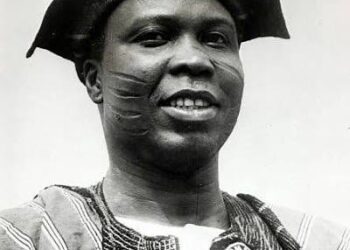Today, we, the proud and resilient people of Ibaji, gather not in celebration, but in deep concern. We stand before the world, and all invested in justice and equitable development, to voice a grave grievance. Our voices, amplified by the undeniable truth of our position as the sole oil-producing local government area in Kogi State, are raised to address the alarming and unconstitutional actions taken by the Kogi State government under the leadership of Governor Alhaji Usman Ahmed Ododo. These actions, specifically the recent amendment to the Kogi State Oil Producing Area Development Commission (KOSOPADC) Law, have systematically sought to disenfranchise and dispossess the Ibaji people of their constitutionally guaranteed rights and entitlements as a host oil-producing community.
THE FOUNDATION OF ENTITLEMENT:
Our struggle for recognition and equitable participation in the benefits derived from our God-given natural resources is not new. However, a beacon of hope and a testament to legislative foresight emerged on 20th December, 2023. On this pivotal date, the former Governor of Kogi State signed into law the Kogi State Oil Producing Area Development Commission Law. This legislation was not merely a policy document; it was a clear affirmation of our constitutional rights, meticulously crafted in alignment with the provisions of the Nigerian Constitution and the Petroleum Industry Act (PIA) 2021. Crucially, this inaugural law unequivocally recognized the primacy of the Host Communities in the governance and management of the commission established to serve them.
Section 6 of the Kogi State Oil Producing Area Development Commission Law 2023 was particularly unambiguous. It stipulated that the Managing Director, Chairman of the Board, Executive Directors, and other members of the Board, excluding ex-officio members and representatives from the Ministries of Finance and Justice, ’’shall be indigenes of the oil-producing communities of the state’’. This was a landmark provision, ensuring that the very individuals tasked with steering the commission, and subsequently directing resource allocation for the development of oil-bearing areas, would hail from and understand the unique needs and aspirations of those areas. It was a decision rooted in fairness, representation, and the principle that those who bear the environmental and social costs of resource extraction should be the primary beneficiaries.
A COMPARATIVE ANALYSIS: PRECEDENT AND PARITY WITH OTHER STATES
To underscore the fundamental fairness and constitutional validity of the 2023 Kogi State law, it is imperative to draw parallels with established legislative frameworks governing similar commissions in sister states that are also oil-producing. These comparisons reveal a consistent legislative intent across Nigeria to empower host communities through direct representation and leadership in development commissions.
IMO STATE OIL PRODUCING AREAS DEVELOPMENT COMMISSION (ISOPADEC) LAW NO. 13 OF 2010: In Imo State, the foundational law, particularly Section 2(1) and other relevant provisions, mandates that key leadership positions within ISOPADEC, namely the Chairman, Secretary, and Managing Director, must be indigenes of the oil-producing areas of Imo State. This ensures direct accountability and community-centric governance.
ONDO STATE OIL PRODUCING AREAS DEVELOPMENT COMMISSION (OSOPADEC) LAW: Similarly, the 2024 Amendment to the OSOPADEC Law, specifically Section 2, clearly states that the Managing Director, Chairman, and Secretary ’’must be an indigene of the oil-producing areas of the State’’. This reiterates the national consensus on the importance of local leadership.
DELTA STATE OIL PRODUCING AREAS DEVELOPMENT COMMISSION (DESOPADEC) LAW, 2015 (AS AMENDED): The Delta State counterpart, DESOPADEC, also upholds this principle. Section 7(1)(b) of the DESOPADEC Law, 2015 (as amended), explicitly outlines that the Chairman, members, the Managing Director, and Executive Directors shall be members of the oil-producing areas of the state. This signifies a long-standing commitment to ensuring that the benefits and governance of oil revenues are intrinsically linked to the communities on whose land these resources are found.
These examples from Imo, Ondo, and Delta states are not isolated instances; they represent a robust and consistent legislative policy across oil-producing states in Nigeria. They demonstrate a clear understanding that the spirit and letter of laws establishing such commissions are designed to empower the direct stakeholders – the host communities. The 2023 Kogi State law was, therefore, not an anomaly but a progressive adoption of best practices, designed to foster genuine development and reconciliation.
THE BETRAYAL OF TRUST: THE 25TH JULY, 2025 AMENDMENT
It is with profound disappointment and a deep sense of betrayal that we note the events subsequent to the enactment of the 2023 KOSOPADC Law. On 25th July, 2025, His Excellency, Governor Usman Ahmed Ododo, signed an amended bill that fundamentally altered the landscape of the KOSOPADC Law. This amendment, instead of building upon the inclusive framework of its predecessor, has acted as a legislative sledgehammer, striking at the heart of the constitutional rights of the Ibaji people. In a move that has shocked and angered our community, vital provisions ensuring our representation and leadership were not only diluted but outright rescinded.
The process leading to this amendment is as egregious as its content. We, the very host community whose lives and environment are directly impacted by oil exploration, and indeed the Honourable Member representing the Ibaji Constituency in the State House of Assembly, were denied any form of public hearing or meaningful consultation. Laws that fundamentally alter the governance structure of resource development commissions, and by extension, the developmental trajectory of specific communities, must be subject to the most rigorous democratic scrutiny. The absence of public hearings signifies a deliberate disregard for due process and the principles of participatory governance that are the bedrock of a just society. This unilateral amendment smacks of executive overreach and an alarming disregard for the voices of the people.
DEPRIVATION OF CONSTITUTIONAL RIGHTS: THE SPECIFIC REVISIONS
The amended law, signed on 25th July, 2025, systematically strips away the rights guaranteed by the 2023 law and recognized in comparable state legislations. The most glaring and damaging of these revisions pertain to the distribution of strategic leadership positions within the commission:
THE CHAIRMAN OF THE BOARD IS ZONED TO KOGI WEST: This directive effectively removes the position of the highest leadership in the commission from the only LGA that produces oil in the state. The Chairman, as the principal officer, is expected to lead the commission’s strategic direction, fund allocation, and overall management to benefit oil-producing areas. Assigning this role to a zone without oil production undermines the very purpose of establishing a commission for oil-producing areas.
THE SECRETARY OF THE BOARD IS ZONED TO KOGI CENTRAL: Similarly, the position of the Secretary, a critical administrative and leadership role responsible for the smooth functioning of the board and the commission’s operations, has also been strategically placed outside the oil-producing region. This further dilutes the influence and direct participation of the Ibaji people.
KOGI EAST LEFT WITH NOTHING: The consequence of these zonal allocations is stark and unconscionable. Kogi East, the specific geographical location where the oil is situated, the specific community whose land is utilized, and the specific people whose environment is affected, is left with no dedicated strategic leadership positions in the KSOPADC. This is not merely an oversight; it is a calculated disenfranchisement.
QUESTIONING THE PRECEDENT: THE LOGIC OF EXCLUSION?
We are compelled to ask a fundamental question, one that exposes the inherent inequity of this amended law: If the oil reserves were located in Kogi Central or Kogi West, would these zones, by any stretch of imagination, accept a legislative arrangement that excluded them from crucial leadership roles within a commission meant to develop their oil-producing areas? The answer, unequivocally, is NO. The current arrangement reeks of bias and a clear intention to marginalize Kogi East and, by extension, the Ibaji people, despite being the direct producers of the state’s oil wealth.
Our rights are not negotiable. They are enshrined in the constitution and affirmed by sound legislative practice in other states. The amendment of July 25, 2025, is a legislative sleight of hand that seeks to rob us of our birthright, to silence our voices, and to deny us the benefits that accrue from resources extracted from our ancestral lands.
OUR DEMANDS: A CALL FOR RECTIFICATION AND RESPECT
In light of these profound injustices and the blatant disregard for our constitutional rights, we, the Ibaji people, acting as the authentic representatives of Kogi State’s oil-producing communities, issue the following firm and respectful demands to the Kogi State House of Assembly and His Excellency, Governor Usman Ahmed Ododo the following:
REJECT THE PROPOSED AMENDMENT IN ITS CURRENT FORMAT: We call upon the Kogi State House of Assembly to immediately and unequivocally reject the amended KOSOPADC Law as signed on 25th July, 2025. This amendment is fundamentally flawed, discriminatory, and antithetical to both the spirit of resource development and the letters of our constitution. Its rejection is paramount to preserving the integrity of our legislative processes and upholding the rights of the people.
RETAIN THE PRINCIPAL LAW (2023) AND AFFIRM COMMUNITY REPRESENTATION: We strongly advocate for the retention of the original Kogi State Oil Producing Area Development Commission Law enacted on 20th December, 2023. Furthermore, we demand that the provisions mandating that all five (5) community representatives on the Board shall be indigenes of oil-producing communities be strictly upheld. This ensures genuine representation and direct community input into the commission’s activities.
ENSURE STRATEGIC LEADERSHIP REFLECTS IBAJI’S UNIQUE CONTRIBUTION: We insist that strategic leadership positions within the KOSOPADC, critically including the Chairman, Secretary, and Managing Director, must equitably reflect the unique contributions and sacrifices of Ibaji, as the sole oil-producing Local Government Area in Kogi State. These positions should be rightfully occupied by indigenes of Ibaji, acknowledging our status as the focal point of oil production and the primary intended beneficiaries of the commission.
CONCLUSION: A PLEA FOR JUSTICE AND EQUITY
We stand at a critical juncture in the history of Kogi State and for the Ibaji people. The recent legislative maneuver to amend the KOSOPADC Law represents a grave threat to our collective well-being and our legitimate claim to equitable development. We have endured the environmental impact of oil exploration, we have supported the state’s economic aspirations, and we have upheld our constitutional duties. It is now justice, fairness, and equity that demand we receive the full benefits and possess the rightful representation as enshrined in law and recognized across the nation.
We appeal to the conscience of our leaders, to the integrity of the Kogi State House of Assembly, and to the broader Nigerian populace to stand with us. Let us ensure that laws are instruments of justice, not tools of oppression or marginalization. The future development and prosperity of Kogi State hinge on our collective commitment to fairness, inclusivity, and the unwavering protection of constitutional rights for all its citizens, especially those who are the bedrock of its resource wealth. We expect swift and decisive action to rectify this grave injustice, ensuring that the KOSOPADC truly serves its intended purpose for the sole oil-producing community: Ibaji.
Copied!















